How to store eggplants at home until winter correctly
Eggplant is a common vegetable for us, especially in the summer season. However, these beneficial fruits for the body deserve not only seasonal, but also year-round use. To extend their use, various storage methods are practiced: from freezing to canning.
The content of the article
Eggplant storage features
The pulp of these vegetables contains a lot of active water.therefore they do not keep fresh for a long time.
Reference. Active (unbound) water accelerates biochemical processes in food and promotes the spread of molds and other microorganisms. To prevent spoilage of products, storage methods are used that inhibit internal chemical reactions: drying, freezing, canning.
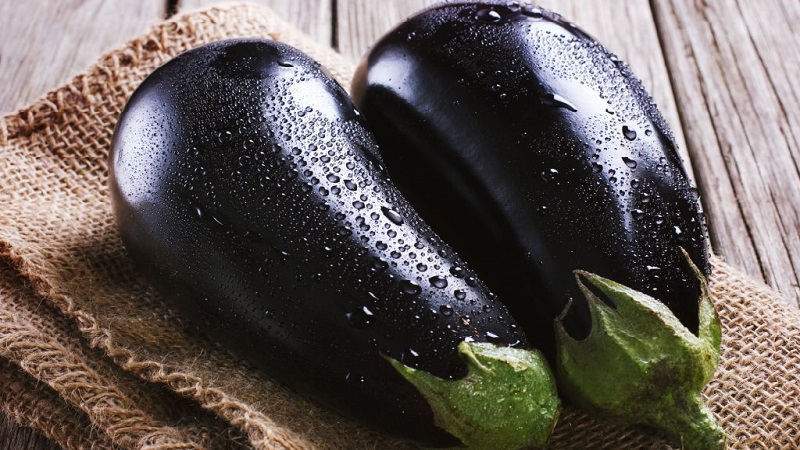
The success of keeping fresh vegetables at home depends on three parameters:
- air humidity;
- temperature;
- illumination.
Optimal temperature conditions for eggplants - + 2 ... + 6 ° C.
Suitable air humidity - 75-85%. Higher rates increase the risk of rot development, and at low humidity the fruits lose their juiciness and wrinkle.
Lack of illumination is a prerequisite for storing this member of the nightshade family. In the light, solanine, which is hazardous to health, is produced in the fruit.
How many fresh eggplants are kept
Processed, canned vegetables have the longest shelf life. Average shelf life of fresh eggplants depending on the storage location:
- cellar (basement) - 3-4 months;
- balcony (cold storage room) - 1 month;
- refrigerator - up to 2 weeks;
- at room temperature - about a week.
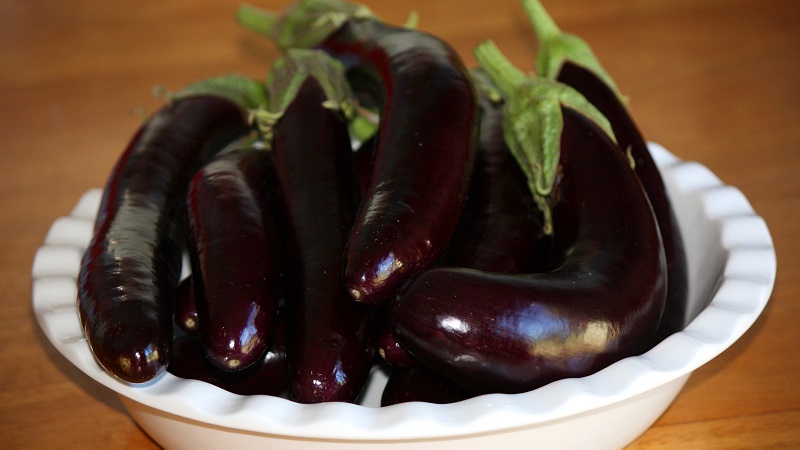
Which eggplants are suitable for long-term storage
Fresh, longest shelf life in late and mid-season varieties (for example, in Torpedo, Romance, Universal 6, Diamond).
To increase the term, they harvest the crop in a timely manner (not earlier or later) and discard the fruit in shape and quality.
Fruit selection
Quality eggplants - firm with a dense glossy skin, without deformation, mechanical damage and signs of rot and insect damage. The color and shape of the harvested vegetables must correspond to the varietal characteristics.
Important! Both unripe and overripe eggplants are not suitable for long-term fresh storage. Consider the timing of the technical ripeness of plants: in mid- and late-ripening varieties, it is 120-130 days from the date of sowing.
The maturity of eggplants is also determined by their appearance.... Overripe fruits, as a rule, have a matte skin, lighter (as if faded), have a soft structure. Unripe in color and size do not differ from ripe, but noticeably lighter in weight.
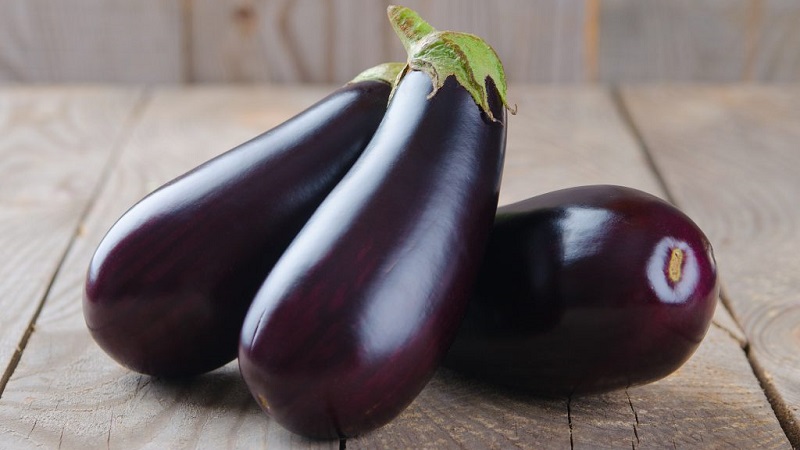
Preparing eggplants for storage
Vegetables are harvested in dry weather, but not in the hottest... Cut off specimens suitable for ripeness, leaving stalks 3–5 cm long.
Cut eggplants are ventilated in the fresh air for 24 hours before storage, protecting from direct sunlight (covered with burlap, put in the shade). A dark room with good ventilation is suitable for drying vegetables. If it is impossible to air the fruit, wipe it with a dry cloth.
Important! Fresh eggplants should not be washed. Water removes the protective film from the skin and reduces the natural biological immunity of vegetables.
How to store eggplant at home
When keeping unprocessed eggplants, the main goal is to preserve their beneficial properties, freshness, juiciness and texture.
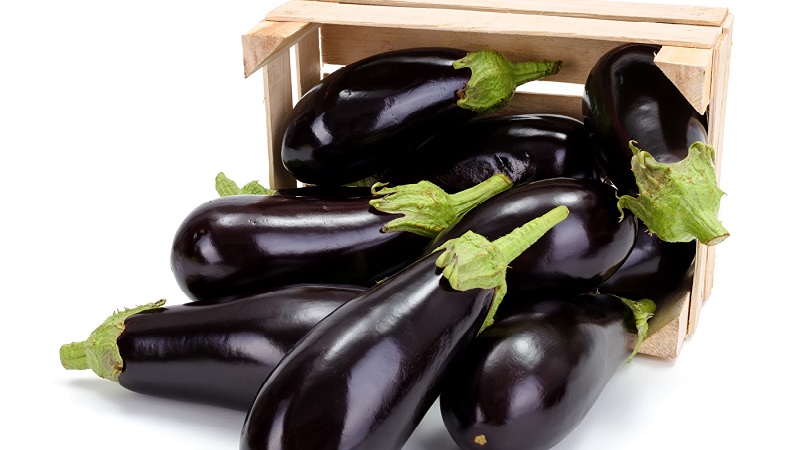
Cellar or basement
These places are most suitable for long-term storage of vegetables.... Temperature, humidity, shading in the basement conditions are close to optimal. The main thing is that the indicators remain stable, without sharp drops.
The most popular storage methods in the cellar:
- laying in layers on the ground / floor / shelves (pre-covered with straw);
- storage in boxes with holes;
- storage in suspended nets.
Provide air ventilation and fruit isolation in the vegetable store... To do this, the eggplants are wrapped in paper, laid in layers, sprinkled with sawdust, ash or river sand.
Important! Do not forget to sort out vegetables from time to time, choosing spoiled ones, keep an eye on the indoor microclimate.
Balcony
On the insulated (glazed) balcony, fresh eggplants are kept in boxes... The bottom is covered with a thick straw mat, the vegetables laid in layers are covered with dry sand or ash. From above, from light and cold, the boxes are covered with burlap. When the temperature drops below + 2 ° C, vegetables are insulated by putting on, for example, an old blanket or rug.
Fresh eggplants are kept on the balcony for about a month, depending on the weather.
Other methods
Other storage methods involve heat treatment, which increases the shelf life of products... In such cases, early maturing eggplant varieties are also used, and the requirements for the quality of the fruits themselves are reduced.
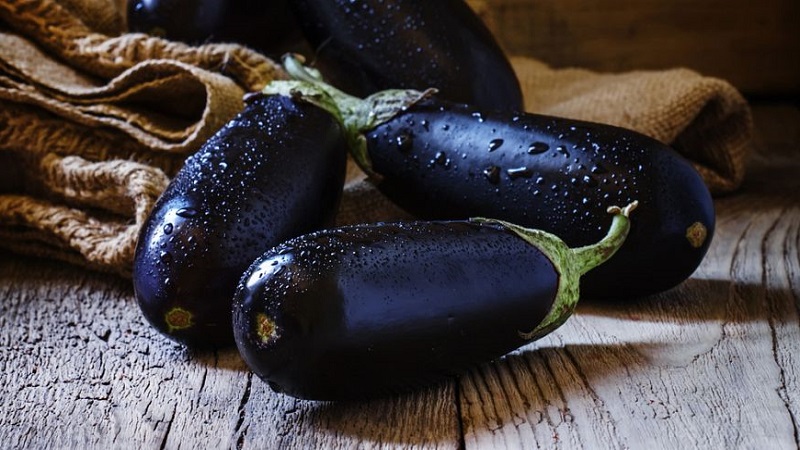
In the freezer
Freezing - an economical way to store, especially for urban residents who do not have a cellar and basement.
Important! Properly frozen vegetables preserve their vitamin and taste properties, save time when using them for food.
The procedure for preparing eggplants for freezing:
- Washing, peeling and slicing - the fruits are cut into cubes, rings, slices, large pieces, and left intact.
- Salt water soak - removes bitterness. The duration of the procedure is 0.5-1 hour, depending on the size of the pieces.
- Pre-heat treatment - prevents the quality and taste of the pulp from deteriorating.
The simplest heat treatment includes:
- blanching - boiling for 5 minutes in salted water;
- easy baking in the oven or frying in a pan.
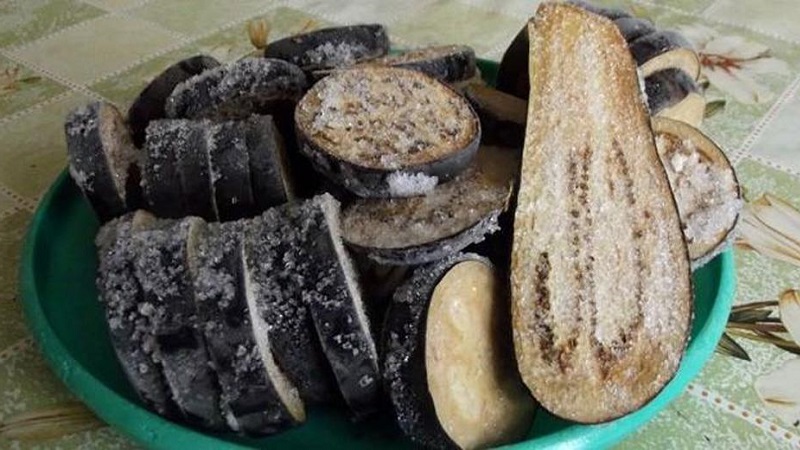
After heat treatment, the eggplants are laid out on a paper napkin to drain off excess oil, and cooled.
Freezing is best done in portions so that the pieces do not stick together. To do this, the processed slices are laid out on a tray (board, baking sheet) in one layer and sent to the freezer.
After the pieces are frozen to the required hardness, they are poured into bags or containers, and the next portion of eggplant is spread on a tray.
Semi-finished products prepared in this way are stored in an airtight container for a long time, up to a year. In winter, they are used to prepare vegetable stews, snacks, side dishes and other dishes.
Dried
Method for preserving vegetables dried does not imply the creation of special conditions... However, it is believed that dishes made from such eggplants do not taste good.
Dry eggplants in three ways:
- in the oven;
- in an electric dryer;
- on open air.
In the first case, the washed and chopped fruits are spread in a thin layer on a baking sheet (without oil) and placed in an oven preheated to + 200 ° C. Drying is carried out at a temperature of + 100 ° C for 5-6 hours with the door ajar.
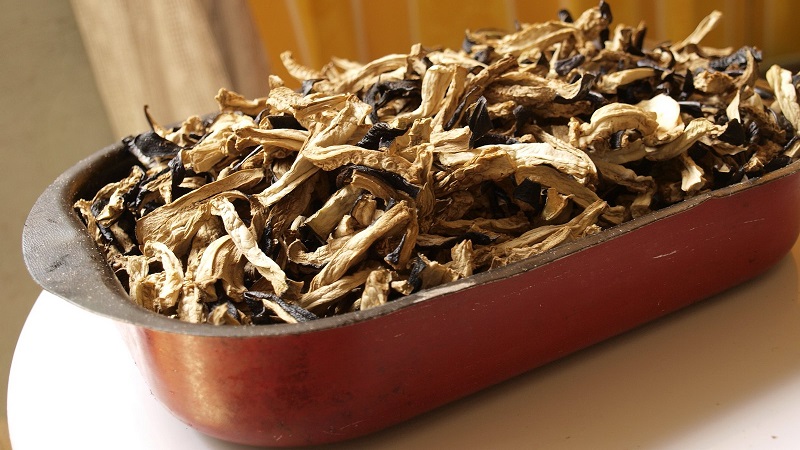
Conveniently dry vegetables in an electric dryer, where the appropriate mode and time are set (on average 7-8 hours).
The third method is the least reliable, since dry weather is required for a high-quality result throughout the entire period.Eggplants, cut into pieces 1.5–2 cm thick, are loosely strung on a string or laid out in a thin layer on a flat surface. Dry them in a shaded dry place with good ventilation for about 5-7 days.
The finished pieces are packed in paper bags, fabric bags or other airtight containers and stored at room temperature. Such preparations are edible for at least a year.
Reference. A variety of dried vegetables is jerky. For this, the fruits are partially dehydrated, and the temperature and drying time are reduced. Such semi-finished products are stored in the refrigerator, in glass jars, filled with vegetable oil.
Canned
The most common way to preserve crops is conservation.... Eggplant salt, fermented, pickle, harvested in the form of salads or traditional eggplant caviar.
There are many recipes for cooking vegetables, especially in the national cuisines of southern countries. Below are some simple options.
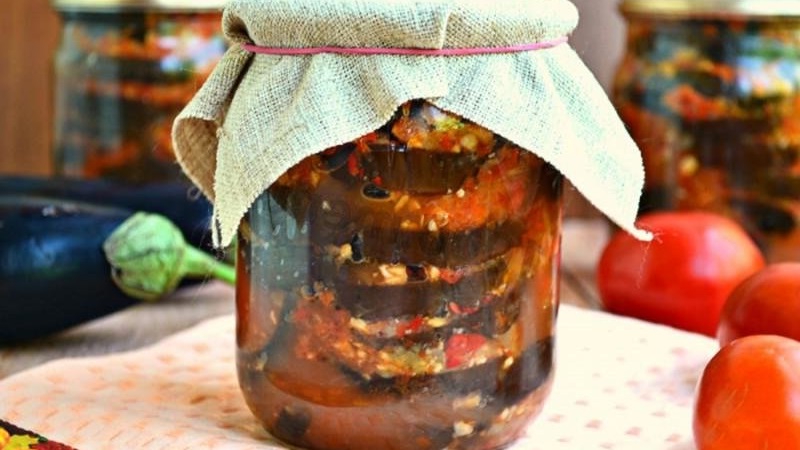
Salted eggplant
Put chopped fruits into an enamel pot (or other salting dish), add chopped dill with garlic to taste, sprinkle with salt (at the rate of 2-3% in relation to the weight of vegetables), mix.
The workpiece ripens under yoke for 2-4 days at room temperatureuntil the brine is cloudy. Store the prepared pickles in a cool place (for example, a refrigerator). After a week, the eggplants are ready to eat.
Pickled eggplant
Whole fruits are cut lengthwise by 2/3 of the thickness, boiled in a large amount of salted water for 10 minutes. Used for filling in various combinations grated carrots, chopped greens, garlic, walnuts, etc. Inside each eggplant (cut) generously add "minced meat".
The fruits are wrapped with threads so that they do not fall apart. The stuffed vegetables are placed in an enamel pan and completely filled with brine (1.5 liters of water, 80–90 g of salt). The sauerkraut is infused under pressure for several days, then transferred to a cool place for storage.
Eggplant appetizer with vegetables
Vegetables are cut into slices, salted and fried in a pan. Fried eggplants are placed in sterilized jars in layers, alternating between them with fresh peppers, tomatoes, carrots, onions, celery, parsley.
Sprinkle the layers with salt, pepper, spices to taste. The mixture is poured with heated vegetable oil, the jars are sterilized in the usual way. The workpieces are stored at room temperature.
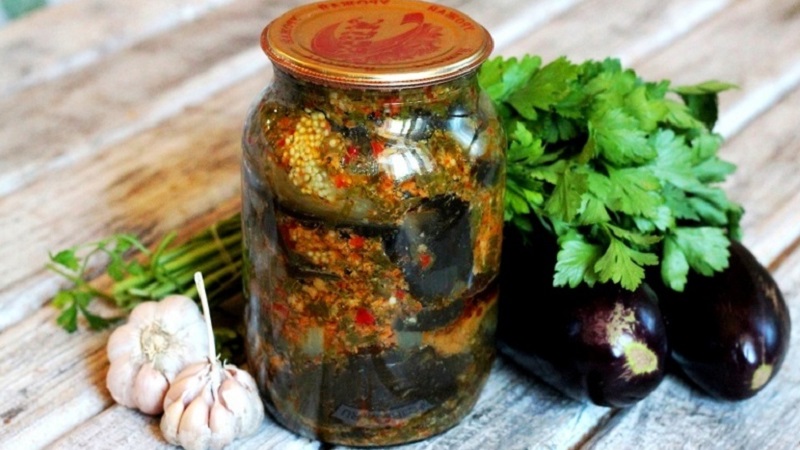
Useful Tips
For the successful storage of fresh eggplants at home:
- vegetables are provided with suitable conditions: a cool dark place with a constant humidity of about 80%;
- use ventilated boxes with holes or baskets: vegetables deteriorate intensively in a closed, tight container;
- isolate fresh fruits from each other and from the external environment (the best solution is thick paper bags: they are gas permeable and provide the necessary darkening, protect vegetables from drying out and rotting);
- limit the contact of eggplants with other vegetables and fruits that produce ethylene during ripening (tomatoes, bananas, apricots, plums, pears).
Conclusion
Fresh and canned eggplants are sold year-round in stores, but many prefer vegetables grown in their own summer cottages. They are consumed both fresh and processed. This enriches the diet with healthy foods not only in summer but also in winter.
For better storage of fruits, they create optimal conditions: they monitor the humidity of the air, temperature, and the absence of direct sunlight. Vegetables are best preserved in the basement or cellar, but they are successfully frozen, dried, dried, canned.